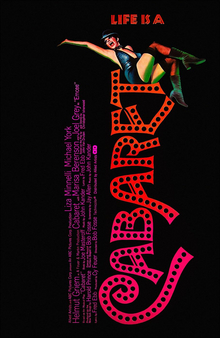A blog formerly known as Bookishness / By Charles Matthews
"Dazzled by so many and such marvelous inventions, the people of Macondo ... became indignant over the living images that the prosperous merchant Bruno Crespi projected in the theater with the lion-head ticket windows, for a character who had died and was buried in one film and for whose misfortune tears had been shed would reappear alive and transformed into an Arab in the next one. The audience, who had paid two cents apiece to share the difficulties of the actors, would not tolerate that outlandish fraud and they broke up the seats. The mayor, at the urging of Bruno Crespi, explained in a proclamation that the cinema was a machine of illusions that did not merit the emotional outbursts of the audience. With that discouraging explanation many ... decided not to return to the movies, considering that they already had too many troubles of their own to weep over the acted-out misfortunes of imaginary beings."--Gabriel García Márquez, One Hundred Years of Solitude
Search This Blog
Showing posts with label Geoffrey Unsworth. Show all posts
Showing posts with label Geoffrey Unsworth. Show all posts
Monday, February 22, 2016
Cabaret (Bob Fosse, 1972)
I've been reading Thomas Mann's The Magic Mountain, in which a young German engineer, recuperating in a tuberculosis sanatorium in the Swiss Alps, decides to read up on physiology. He concludes that life itself is a kind of disease, "a fever of matter." In Cabaret, Sally Bowles (Liza Minnelli) proclaims that "life is a cabaret, old chum." Yet given that the cabaret presided over by the Master of Ceremonies (Joel Grey) in the film is a febrile sort of place, there's a coherence between the two views. Director Bob Fosse would himself go on to posit a relationship between illness and creativity in All That Jazz (1979). And Sally Bowles's favorite phrase, the seeming oxymoron "divine decadence," suggests that out of decay comes something higher. What would be the opposite, after all: satanic order? In perhaps the movie's most chilling moment, Fosse gives us a closeup of a cherubic, well-scrubbed young face, the very opposite of the Master of Ceremonies's rouged and lipsticked face that has dominated the film from the very beginning. The boy then begins to sing "Tomorrow Belongs to Me," and as the camera pulls back we see that he is wearing the uniform of the Hitler Youth. As the crowd at the open-air beer garden, which has to this point seemed an idyllic setting, joins in and begins to raise their arms in the Nazi salute, we view the very definition of satanic order. But enough German dialectics here; just let me say that Cabaret is one of my favorite movie musicals. As I have said before in this blog, I prefer musicals created originally for the movies, like the Warner Bros. films with the kaleidoscopic routines of Busby Berkeley, the Fred Astaire-Ginger Rogers movies, or the sublime Singin' in the Rain (Stanley Donen and Gene Kelly, 1952), and not the musicals like West Side Story (Jerome Robbins and Robert Wise, 1961) or My Fair Lady (George Cukor, 1964), that were translated to film from the stage. My admiration for Cabaret would seem to be an exception to that rule, except that when Fosse became director, he jettisoned the book that had been written by Joe Masteroff for the 1966 Broadway musical and went back to the source, Christopher Isherwood's 1939 The Berlin Stories. Jay Presson Allen had been commissioned to write the screenplay, but Hugh Wheeler (credited as "research consultant") heavily revised what she had written. Fosse also dropped many of the songs by John Kander and Fred Ebb, though he added new ones by them: "Money, Money" and "Mein Herr," along with one of their older songs not from the Broadway version, "Maybe This Time." And he made the significant decision to keep the musical numbers confined to the Kit Kat Klub stage -- a touch of cinematic realism that seems essential to a story set in Berlin during the rise of the Nazis. The result is a musical essentially created (or at least re-created) for the movies. It received 10 Oscar nominations and won eight of them, including awards for Minnelli, Grey, and Fosse, as well as for Geoffrey Unsworth's cinematography. The only categories in which it lost were best picture and best adapted screenplay, which went to The Godfather and its screenwriters, Mario Puzo and Francis Ford Coppola.
Tuesday, October 6, 2015
2001: A Space Odyssey (Stanley Kubrick, 1968)
Dave Bowman: Keir Dullea
Frank Poole: Gary Lockwood
HAL 9000: Douglas Rain (voice)
Director: Stanley Kubrick
Screenplay: Stanley Kubrick, Arthur C. Clarke
Based on a story by Arthur C. Clarke
Cinematography: Geoffrey Unsworth
Production design: Ernest Archer, Harry Lange, Anthony Masters
Subscribe to:
Comments (Atom)

